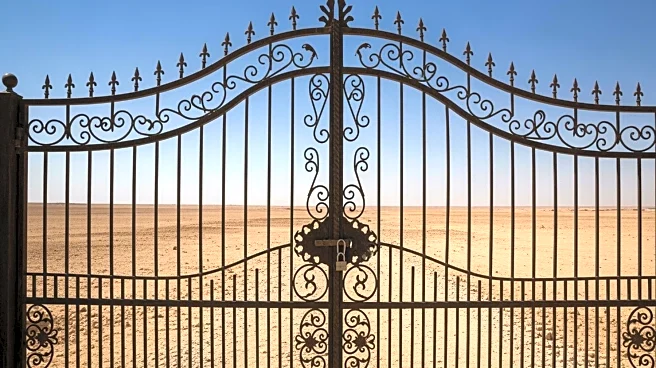What's Happening?
Israeli Prime Minister Benjamin Netanyahu announced that the Rafah border crossing between Gaza and Egypt will remain closed until further notice. This decision is contingent upon Hamas handing over the bodies
of deceased hostages. The closure comes despite the Palestinian embassy in Egypt's announcement that the crossing would reopen for entry into Gaza. Hamas criticized Netanyahu's decision, claiming it violates the ceasefire agreement and hinders the recovery of hostage bodies. The ceasefire, brokered by the U.S., involves the exchange of hostages and bodies between Israel and Hamas. Israel has returned 15 bodies for each Israeli body received, but accuses Hamas of being slow in returning the bodies of deceased hostages. The Rafah crossing has been largely shut since May 2024, and its closure affects the delivery of humanitarian aid to Gaza.
Why It's Important?
The closure of the Rafah crossing and the slow exchange of bodies highlight the fragility of the ceasefire agreement between Israel and Hamas. This situation impacts the humanitarian aid flow into Gaza, where many people face famine conditions. The ceasefire is part of a broader plan to end the two-year conflict, which includes disarming Hamas and establishing governance in Gaza. The ongoing dispute over the return of bodies could jeopardize the ceasefire and the broader peace plan. The situation affects regional stability and has implications for international relations, particularly involving the U.S., which brokered the ceasefire.
What's Next?
The continuation of the ceasefire and the reopening of the Rafah crossing depend on the resolution of the body exchange dispute. Further negotiations may be required to address the disarmament of Hamas and the governance of Gaza. The international community, including the U.S., may need to intervene to ensure the ceasefire holds and humanitarian aid reaches those in need. The situation remains tense, with potential for further conflict if agreements are not honored.
Beyond the Headlines
The closure of the Rafah crossing and the slow exchange of bodies raise ethical and humanitarian concerns. The delay in returning bodies affects grieving families and highlights the challenges of post-conflict recovery. The situation underscores the complexity of peace negotiations in regions with deep-seated conflicts. Long-term solutions require addressing underlying issues such as governance, security, and economic development in Gaza.










